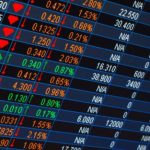
Equity markets were mixed on Wednesday as investors awaited former U.S. President Donald Trump’s highly anticipated tariff announcement later in the day. The uncertainty surrounding the details of the measures has fueled volatility across global trading floors.
Trump, who has described the move as “Liberation Day,” has accused both allies and rivals of exploiting the United States through unfair trade practices. While the specifics remain unclear, reports suggest he is considering broad 20 percent levies or a tiered system that grants preferential treatment to certain nations.
Additionally, a previously announced 25 percent tariff on automobiles is set to take effect on Thursday. The White House confirmed that Trump will unveil his decision at 4:00 p.m. in Washington (2000 GMT), after U.S. markets close. Officials admitted, however, that the final details were still being refined as of late Tuesday.
The lack of clarity has unsettled markets, with analysts warning of potential economic repercussions.
“Investors and company management dislike uncertainty, and the piecemeal, unreliable way in which tariff announcements are being delivered is creating plenty of it,” said Oliver Blackbourn and Adam Hetts of Janus Henderson Investments.
They noted that estimates for the average tariff rate vary widely, from moderate increases to severe double-digit hikes. “What does seem less uncertain is that tariffs are, without much exception, likely to be bad for economic growth, consumers, and markets,” they added.
Chris Weston of Pepperstone Group suggested that immediate implementation of the tariffs might provide some level of certainty, though it would also reduce the scope for negotiations. “This scenario—while hardly a positive for economic growth or corporate earnings—would at least allow investors to respond to the ‘facts’ rather than speculation,” he explained.
Several countries have already signaled their intent to retaliate, raising concerns about a broader trade conflict. Economists warn that new tariffs could slow global economic growth and drive inflation higher, potentially forcing central banks to reconsider their interest rate policies.
Asian markets fluctuated throughout the day, with Tokyo, Shanghai, Sydney, Wellington, Taipei, Mumbai, and Bangkok posting gains, while Hong Kong, Singapore, Manila, and Seoul declined.
Safe-haven gold remained above $3,100 per ounce after reaching a record high of $3,149 on Tuesday.
Meanwhile, shares of Chinese tech giant Xiaomi fell three percent in Hong Kong, extending Tuesday’s losses of more than five percent. The decline followed confirmation that one of its electric vehicles was involved in a fatal accident in China.
Market Overview (0715 GMT)
• Tokyo – Nikkei 225: UP 0.3% at 35,725.87 (close)
• Hong Kong – Hang Seng Index: DOWN 0.1% at 23,174.59
• Shanghai – Composite: UP 0.1% at 3,350.13 (close)
• London – FTSE 100: DOWN 0.3% at 8,609.85
• New York – Dow Jones: FLAT at 41,989.96 (close)
Currencies:
• Euro/dollar: UP at $1.0795 from $1.0793 on Tuesday
• Pound/dollar: DOWN at $1.2914 from $1.2920
• Dollar/yen: UP at 149.77 yen from 149.53 yen
• Euro/pound: UP at 83.57 pence from 83.51 pence
Commodities:
• West Texas Intermediate (WTI) crude: DOWN 0.3% at $71.01 per barrel
• Brent North Sea crude: DOWN 0.3% at $74.30 per barrel
Despite Wednesday’s announcement, some analysts believe uncertainty will persist. HSBC strategists, led by Max Kettner, warned that the deadline may not mark the end of tariff-related volatility.
“We’d argue the potential is in fact higher for the deadline to introduce even more uncertainty—and hence prolonged broad-based weakness in leading indicators,” they cautioned.
As the world awaits Trump’s final decision, markets brace for potential aftershocks that could shape global trade dynamics for years to come.








